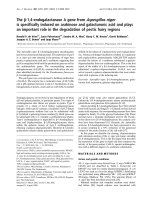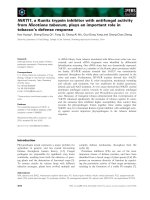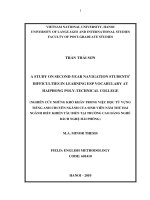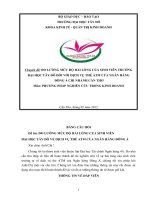A STUDY ON VOLUNTEERING ACTIVITIES AMONG STUDENTS AT UNIVERSITY_HOẠT ĐỘNG TÌNH NGUYỆN CỦA SINH VIÊN ĐẠI HỌC
Bạn đang xem bản rút gọn của tài liệu. Xem và tải ngay bản đầy đủ của tài liệu tại đây (382.43 KB, 18 trang )
A STUDY ON
Volunteering activities among students
at University
ABSTRACT
Volunteer work plays an important role in the social and community development of each
country, especially developing countries with low GPA. The benefits that it brings are
great, but for many people, especially students, still do not know the nature of
volunteerism. They still have no interest in volunteering, so the number of participants is
not really that much or joining for compulsory reasons. This paper investigates some type
of volunteering; the amount of time spent on volunteering among university students as
well as several benefits it brings to us. Besides, effective advices to encourage voluntary
activities are also mentioned. The methodology of this article use questionnaire and
interviews of students. The purpose of this research is raising students’ awareness about
volunteering. It is hoped that this research could be useful resource for students about
volunteering.
Table of contents
List of figures
Figure 1: The percentage of students who join in volunteering.
Figure 2: The reasons students want to be a volunteer.
Figure 3: The amount of time students spending on volunteering.
Figure 4: The percentage of students who feel about benefits of volunteer.
1. Introduction
Volunteering plays an important role in the development of many countries around the
world. According to Cynthia More, a volunteer is the person who dedicates time to help
the others with poor condition without having profits or other benefits. After 1990, the
number of volunteer participants has increased sharply, and a particular interest has been
given in order to encourage citizens in the life of societies and make them responsible,
teenagers in particular. 2011 was considered as the European Year of Volunteering when
the number of organized activities and events was numerous in the European Union. In
that time, a study was conducted within Europe to find and analyze relevant aspects
related to voluntary activities. A result of the study shows that volunteering does not
depend on age or sex, but educated people are the most popular class in joining voluntary
organizations. On the subject of interest, solidarity and humanitarian aid were ranked the
highest. Regarding the benefits, volunteering has the important contributions to the
developments of young generation, improves knowledge and life skills and promotes
social demands (TNS Opinion and Social, 2011). The results of a study carried out by the
Centre of Marketing and Social Forecasting in Roman in 2013 showed that students took
part in voluntary activities the most – 29%. Almost they are interested in social services
related to education and environment. The important purpose of voluntary decision is
help people (40%) (CMPS, 2013). As it can be seen from the statistics provided above, in
our country with a developed education, volunteer movement is held in many schools and
localities, among them can be mentioned as blood donation movement, donation to
support flood victims, families with poor conditions. These are very practical and
meaningful actions, bringing many benefits to society. However, there are some students
who still do not fully understand the role and importance of volunteering, never even
participating in those activities. Therefore, raising the awareness and responsibilities of
each student is one of the main works to do.
On the basis of these ideas, this paper provides information about some kinds of
voluntary activities, the amount of time students spent on as well as the purpose which
they join in and some advantages of volunteering which provided by students of Ha Noi
University. The questions which have provided for the study were: What kind of
voluntary works they join in? How much time they spent on it? Why do they enjoy? And
what are the advantages they bring?
2. Method
This research paper is based on data survey by collecting questionnaires and interviews.
At the beginning, we randomly selected regardless of gender and education level of 50
students to fill in a questionnaire. It includes 9 questions divided into 4 main groups.
Firstly, there are 2 questions about the amount of time and student participating in
volunteering. Secondly, a question was designed to show kinds of voluntary activities
they join in. Thirdly, questionnaires consist of some multiple-choice questions and a
scaled question which perform the reason students take part in. Finally, another scaled
question has willingness to conduct benefits of volunteering. The main aim is to enquire
deeper into students’ opinions about voluntary works. Actually, some useful ideas of
students were conducted in the interviews.
3. Results
This research collected ideas from 50 students of Ha Noi University regardless of gender
and learning ability. Firstly, all of them have been asked about their previous volunteer
work and according to the data we collected, up to 40% of students have never
participated in volunteering. Among the remaining 60% of students, most of them
participate in donations to support families in difficult circumstances and blood donation
programs at school. Most are of the same opinion that they choose to become volunteers
to help the local community and make friends.
Figure 1: The percentage of students who join in volunteering
With regard to volunteer reviews, we give 5 main features included boring, waste of time
difficult, interesting and useful. So as to simplify the statistics, “boring”, “waste of time”,
“difficult” has been grouped into “negative feedbacks”, the others have been combined
and labeled “positive feedbacks”. Of the 50 students were surveyed, 60% of them
responded that volunteering is interesting and helpful experience, while the others think
that it is bad and boring.
Regarding to the reasons students want to become a volunteer, we give 3 ideas including
“Help my local community”, “Meet people/ make friends”, “Learn new skills”, almost
half of students agree with the first reason (47%), 33% of pupils are satisfied with the
second idea and the others hold final (20%).
Figure 2: The reasons students want to be a volunteer
Figure 3: The amount of time students spend on volunteering
Turning to benefits of volunteering, we provided 5 main advantages for pupils to examine
how the results of volunteering affect them included “ confidence, self-esteem or selfmanagement”, “Skill like teamwork, communication, leadership”, “Health, well-being or
fitness”, “Time management” and “Conflict resolution skills”. More than a half of those
said that they feel normal after finishing voluntary works. The percentage of students
who get the benefits of volunteering is over 40%. Meanwhile, the others felt worse when
they completed voluntary activities, accounting for more than 15%.
4. Discussion of findings
4.1. Some kinds of voluntary activities which students enjoy
According to the results we collected, most students participate in volunteer activities that
take place at the school. A student said that: “My school often has a lot of volunteer
activities that take place every year, so volunteering is very easy and brings excitement
when they can make friends with other departments”. There are many kinds of
volunteering we can mention, such as fundraising and administration; environmental,
elderly and disabled, homeless. Each job has different activities and benefits depending
on the desire of each student to join. For instance, in environmental activities, everyone
will take part in environmental protection works like cleaning streets, planting trees,
collecting the garbage around the beach... With the students interviewed, most of them
joined in the blood donation program at school. This is a very regular activity in every
school without spending too much time on students. Moreover, it brings tremendous
benefits to society when it saves the lives of many people. However, to be able to
participate, you need to have good health, not infectious diseases. Besides, volunteer
programs to help flood victims and disadvantaged families are also encouraged by
students. This can be considered experience activities when you will set up a group and
go directly to difficult areas to help them. It will take a lot of students’ time to prepare
and participate as well as demand good health and enthusiasm, but this is really a good
experience and brings many positive things.
Overall, there are many volunteer programs suitable for students depending on their
interests and abilities.
4.2. The amount of time which students spent on voluntary activities
According to the results as shown in figure 3, page 4, it can be unexpected that the time
spent on volunteer work of students is very small. Although it can be said that in our
country, activities have been expanded throughout all schools and widely propagated, the
number of participants has not yet reached expectations. This leads us to ask why the
time pupils spend volunteering is so little. A first-year student explained that: “Study time
is one of the barriers for us to participate in volunteer work; the subjects are quite
difficult so we need to focus on that”. This is a common problem among the students
when the study is one of the top issues in our country. Besides, the reason pupils do not
like to volunteer is because it is somewhat boring. Most students will enjoy activities
such as playing sports, playing video games or participating in social network sites daily.
It is easy to see that your awareness of volunteering is not right, thinking that
volunteerism is complicated and difficult, costly and time consuming.
4.3 Reasons why students enjoy voluntary activities
On the whole, the main reason encourages students to do volunteer work is to help the
local community with 47% agree with this statement. Followed, meet people and make
friends rank second with 33%. Finally, it is learning new skills which stand at 20%. This
figure gives us an overview data about which factor is the most important that affect
student choice. It is easy to see that the motivation to have a contribution to society is the
biggest acceleration to voluntary work. In addition, benefits from it also a noticeable
point when the chance to make friend and broaden knowledge is pretty high.
4.4. Benefits of volunteering
According to the results as shown in Figure 3 we can jump to conclusion that regarding
the enhancement in confidence, self-esteem or self-management, students find no benefit
in other skills like teamwork, communication, leadership, or technical skills; health, wellbeing or fitness, time management; conflict resolution skills. This result comes as no
surprise to us that the percentage of students join in volunteer activities among students
stands at a low level. The question is to mention to some positive side of volunteer
activities which was conducted randomly on 50 students has pointed out volunteer
activities help they develop perceptive ability such as confidence, self-esteem or selfmanagement. It is understandable because your role as a volunteer can also give you a
sense of pride and identity, and the better you feel about yourself, the more likely you are
to have a positive view of your life and future goals (Jeanne Segal, 2018). On the other
hand, in contrast with the former idea, the other sections seem to raise less carefulness
from the student when most of them vote for stay the same. This phenomenon is
explained by Harold Goodwin “The problem is not with the volunteers, although they
should be more wary of the motives and practices of the organizations that send
volunteers”. Another noteworthy point is skills like teamwork, communication,
leadership, or technical skills is received a smaller percentage of people in agreement
than we thought with 12% increased greatly and 28% increased whereas up to 56%
chosen stay the same. In theory, joining a charity organization help you chance to
practice important skills used in the workplace, such as teamwork, communication,
problem-solving, project planning, task management, and organization. However, our
statics has not shown a positive fact about volunteer activities. The problem causes this
fact can be ineffective of some organizations or clubs on campus, and students also
should join in these activities regularly with a dynamic, pleasure and voluntary spirit.
5. Recommendations
Based on the above discussion, the following advices are given. Regarding to the amount
of time spent on volunteering, the time that students volunteer is greatly influenced by
factors such as academic issues, family and students’ psychology. Therefore, Universities
and Volunteer organizations need to co-operate and motivate students to do this. For
instance, schools should increase their extra-curricular activities for students who
volunteer and open skills-based classes to become a volunteer; voluntary organizations
need to open more campaigns and propaganda about benefits of volunteering to raise
students’ awareness.
With regard to difficulties encountered when volunteering, they should set up specific
plans such as travel routes and what to do during the trip so that students can understand
when going directly to remote areas. On the part of students, it would be the best for
students when fully equipped to participate voluntarily and responsibly in assigned tasks,
be friendly with people.
6. Conclusion
In conclusion, we really hope the results and analysis would be a good source of
motivation for students to become volunteers. The article still has many limitations in
discovering the effects of volunteering for students as well as aspects like age, gender or
psychology that influence their ability to volunteer. It is our hope that in the future, there
would be more research articles on this subject going further into solving these
limitations and making the topic perfectly.
References
Centrul de Marketing şi Prognoză Socială (2013). Responsabilitatea socială individual în
România [Individual Social Responsibility in Romania], Asociaţia React.
Accessed:
06-02-2016.
Available
content/uploads/2014/01/
at: />
Responsabilitatea-sociala-individuala-in-
Romania.pdf.
Cynthia W Moore (Dec 1996). The effects of volunteering on the young volunteer. The
Journal
of
Prevention
17(2):231-258.
Retrieved
from
URL:
/>ing_on_the_young_volunteer?fbclid=IwAR1BHP1ZM4cHPLGjIJMysBWLqCh
cMYFv5zO0ft9_dHRwgJjdfDw04l_R18
Jeanne Segal, Dec2018 Volunteering and its Surprising Benefits. Helpguide. Retrieved
from URL: />Harold Goodwin JUNE 22, 2015 Volunteering: “the road to hell is paved with good
intentions. Wtm. Retrieved from URL ” />TNS Opinion & Social (2011). Voluntariatul şi solidaritatea între generaţii,
Eurobarometru special [Volunteering and Intergenerational Solidarity, Special
Eurobarometer], Direcţia Generală Comunicare, Parlamentul European.
Accessed:
06-02-2016.
Available
at:
www.europarl.europa.eu/pdf/eurobarometre/2011/juillet/04_07/rapport_%20eb7
5_2_%20benevolat_ro.pdf
Appendix A
Questionnaire
Volunteering activities to students
1. What is your statement about volunteer activities?
□ Boring
□ Waste of time
□ Difficult
□ Interesting
□ Useful
□ Others………………………………………..
2. Are you currently join any charity work? (Volunteering, fundraising, donating)
□ Yes
□ No (you may skip question 3 and 4)
3. What kind of voluntary activities you took part in?
□ Flood victims donation programs
□ Donation to poor condition families
□ Blood donation programs
□ Others ………………………………………..
4. Why did you choose to become involved in volunteering activities?
□ As an alternative to full-time paid employment
□ To help my local community
□ To meet people/make friends
□ To learn new skills
□ Others …………………………………………….
5. What are the volunteer activities that you did?
□ Teaching the children
□ Collecting the garbage
□ Playing traditional games
□ Others……………………………………………….
6. How often have you carried out this volunteering within the past 12 months?
□ Very occasionally
□ A couple of times per year
□ One or two day a month
□ One day a week or more
7. How much do you agree or disagree that you get these things out of being a
volunteer?
8. Have any of the following statements increased or decreased for you as a result of
volunteering?
9. What are the difficulties from joining in voluntary work?
□ Lack of time
□ Financial problems
□ Health problems
□ Lack of knowledge and skills
Thank you for your cooperation!
Appendix B
Questionnaire results
Volunteering activities to students
1. What is your statement about volunteer activities?
Boring + Waste of time + Difficult
40%
Interesting + Useful
60%
Others………………
0%
2. Are you currently join any charity work? (Volunteering, fundraising, donating)
Yes
60%
No (you may skip question 3 and 4)
40%
3. What kind of voluntary activities you took part in?
Flood victims donation programs
15%
Donation to poor condition families
20%
Blood donation programs
75%
Others ………………………..
0%
4. Why did you choose to become involved in volunteering activities?
As an alternative to full-time paid employment
0%
To help my local community
47%
To meet people/make friends
33%
To learn new skills
20%
Others …………………………………………….
0%
5. What are the volunteer activities that you did?
Teaching the children
40%
Collecting the garbage
50%
Playing traditional games
10%
Others……………………………………………….
6. How often have you carried out this volunteering within the past 12 months?
Very occasionally
20%
A couple of times per year
64%
One or two day a month
8%
One day a week or more
8%
7. How much do you agree or disagree that you get these things out of being a
volunteer?
8. Have any of the following statements increased or decreased for you as a result of
volunteering?
9. What are the difficulties from joining in voluntary work?
Lack of time
40%
Financial problems
8%
Health problems
22%
Lack of knowledge and skills
30%









